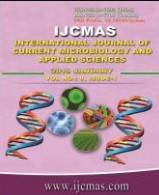


 National Academy of Agricultural Sciences (NAAS)
National Academy of Agricultural Sciences (NAAS)

|
PRINT ISSN : 2319-7692
Online ISSN : 2319-7706 Issues : 12 per year Publisher : Excellent Publishers Email : editorijcmas@gmail.com / submit@ijcmas.com Editor-in-chief: Dr.M.Prakash Index Copernicus ICV 2018: 95.39 NAAS RATING 2020: 5.38 |
Tomato is one of the most popular and widely grown vegetables in the world which ranks next to potato. Although tomato is generally grown under irrigated conditions, its cultivation as a rainfed crop has gained importance particularly in semi-arid regions. It has been established that stress due to water deficit is a very important limiting factor at the initial phase of plant growth and establishment. Studies on physiological evaluation of tomato genotypes is limiting in the drought stress condition. Hence, the present investigation was carried out to screen the tomato genotypes for various Number of fruits / plant, Average fruit weight, Equatorial diameter (mm), Polar diameter (mm), Pericarp thickness, Number of locules/fruit, Yield/plant Yield/ hectare, Carotenoid content, TSS, Ascorbic acid content, Lycopene content and yield potential by adopting simple field screenings with regulated two levels of irrigation at two different stages of plant growth to know the effect of drought on tomato genotypes. The experiment was laid out in a factorial randomized block design with thirteen genotypes and two replications. Water stress was imposed two weeks after the transplanting to all the genotypes in two stress conditions viz the IW/CPE ratio of 0.40, 1.20 and farmers practice as control. Furrow irrigation was given when the pan evaporation reading reached 41.66 mm (1.20 IW/CPE ratio) and 125 mm (0.40 IW/CPE ratio) using V notch. Under moisture stress condition of 1.2 IW/CPE ratio the genotype, Arka Meghali had significantly higher yield (1.65 kg plant-1 and 49.95 t ha-1) and under the sever moisture stress of 0.4 IW/CPE ratio higher yield was noticed in the genotype EC 631962 (1.37 kg plant-1 and 39.48 t ha-1) and least yield was noticed in the susceptible genotype EC 608269 (0.66 kg plant-1) at 0.4 IW/CPE ratio. Irrespective of the irrigation levels, EC 638519 had maximum number of fruits per plant. Genotypes EC 608362, EC 610652, EC 634394, EC 638519, EC 610661, EC 631962, Kashi Anupam and Pusa 120 performed better under drought conditions
 |
 |
 |
 |
 |